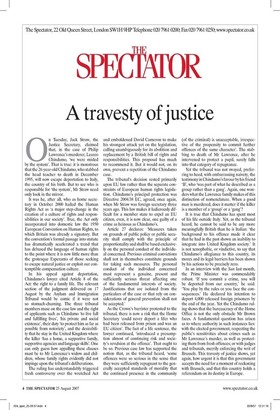A travesty of justice
n Tuesday, Jack Straw, the Justice Secretary, claimed that, in the case of Philip Lawrence's murderer, Learco Chindamo, 'we were misled by the system'. That is true: it is monstrous that the 26-year-old Chindamo, who stabbed the head teacher to death in December 1995, will now escape deportation to Italy, the country of his birth. But to see who is responsible for `the system', Mr Straw need only look in the mirror.
It was he, after all, who as home secretary in October 2000 hailed the Human Rights Act as 'a major step-change in the creation of a culture of rights and responsibilities in our society'. True, the Act only incorporated into domestic law the 1950 European Convention on Human Rights, to which Britain was already a signatory. But the convention's formal passage into statute has dramatically accelerated a trend that has debased the language of human rights to the point where it is now little more than the grotesque Esperanto of those seeking to escape natural justice or exploit our contemptible compensation culture.
In his appeal against deportation, Chindamo's lawyer cited Article 8 of the Act: the right to a family life. The relevant section of the judgment delivered on 17 August by the Asylum and Immigration Tribunal would be comic if it were not so stomach-churning. The three tribunal members muse on the case law and the right of applicants such as Chindamo 'to live full and fulfilling lives', 'his private and social existence', their duty 'to protect him as far as possible from notoriety', and the desirability that he stay in the United Kingdom where the killer 'has a home, a supportive family, supportive agencies and language skills'. One can only guess how appalling these clauses must be to Mr Lawrence's widow and children, whose family rights evidently did not impinge upon the tribunal's deliberations.
The ruling has understandably triggered fresh controversy over the wretched Act and emboldened David Cameron to make his strongest attack yet on the legislation, calling unambiguously for its abolition and replacement by a British bill of rights and responsibilities. This proposal has much to recommend it. But it would not, on its own, prevent a repetition of the Chindamo case.
The tribunal's decision rested primarily upon EU law rather than the separate constraints of European human rights legislation. Chindamo's principal protection was Directive 2004/38 EC, agreed, once again, when Mr Straw was foreign secretary three years ago. This law makes it ludicrously difficult for a member state to expel an EU citizen, even, it is now clear, one guilty of a crime as heinous as Chindamo's.
Article 27 declares: 'Measures taken on grounds of public policy or public security shall comply with the principle of proportionality and shall be based exclusively on the personal conduct of the individual concerned. Previous criminal convictions shall not in themselves constitute grounds for taking such measures. The personal conduct of the individual concerned must represent a genuine, present and sufficiently serious threat affecting one of the fundamental interests of society. Justifications that are isolated from the particulars of the case or that rely on considerations of general prevention shall not be accepted.'
As the Crown's barrister protested to the tribunal, there is now a risk that the Home Secretary 'could never deport a lifer who had been released from prison and was an EU citizen'. The fact of a life sentence, the lawyer continued, 'introduced a presumption almost of continuing risk and society's revulsion at the offence'. That ought to be so. Previous case law has supported the notion that, as the tribunal heard, 'some offences were so serious in the sense that they were sufficiently repugnant to the generally accepted standards of morality that the continued presence in the community (of the criminal) is unacceptable, irrespective of the propensity to commit further offences of the same character'. The stabbing to death of Mr Lawrence, after he intervened to protect a pupil, surely falls into that category of repugnance.
Yet the tribunal was not swayed, preferring to heed, with embarrassing naivety, the testimony in Chindamo's favour by his friend 13', who 'was part of what he described as a group rather than a gang'. Again, one wonders what the Lawrence family makes of this distinction of nomenclature. When a good man is murdered, does it matter if the killer is a member of a 'group' or a 'gang'?
It is true that Chindamo has spent most of his life outside Italy. Yet, as the tribunal heard, he cannot be said to be any more meaningfully British than he is Italian: 'the background to his offence made it clear that he had in the past shown an inability to integrate into United Kingdom society.' It is not xenophobic, or vindictive, to say that Chindamo's allegiance to this country, its mores and its legal barriers has been shown by his actions to be precisely zero.
In an interview with the Sun last month, the Prime Minister was commendably robust. `If you commit a crime, you will be deported from our country,' he said. 'You play by the rules or you face the consequences.' He declared his intention to deport 4,000 released foreign prisoners by the end of the year. Yet the Chindamo ruling shows that the bureaucracy of the Home Office is not the only obstacle Mr Brown faces. A fundamental question has arisen as to where authority in such instances lies: with the elected government, respecting the public's sensitivities about crimes such as Mr Lawrence's murder, as well as protecting them from fresh offences; or with judges and tribunals, merrily enforcing the writ of Brussels. This travesty of justice shows, yet again, how urgent it is that this government accepts the need for a moment of reckoning with Brussels, and that this country holds a referendum on its destiny in Europe.









































 Previous page
Previous page